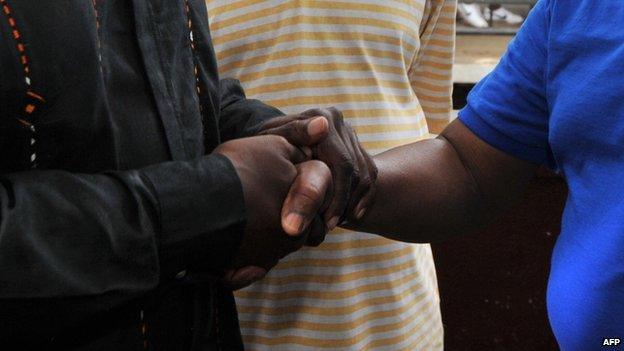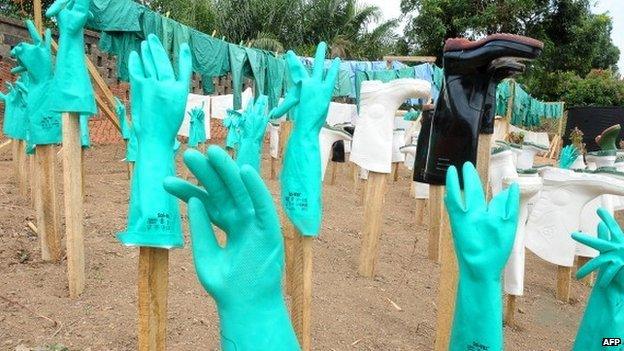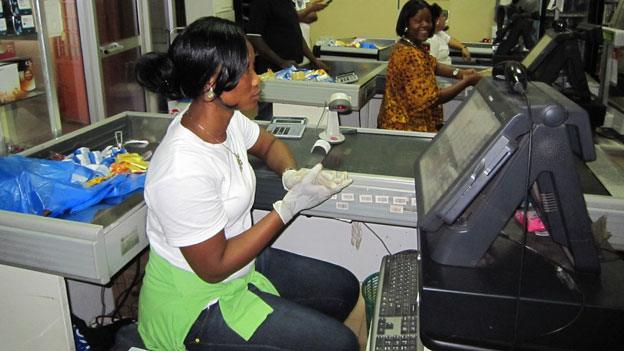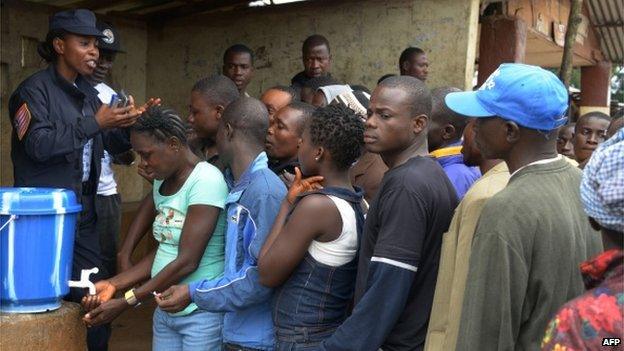Ebola outbreak: How Liberia lost its handshake
- Published

People in Liberia are advised not to shake hands in an attempt to stop the spread of Ebola
Families and communities have been devastated by the deaths caused by West Africa's Ebola outbreak. But the disease also has consequences for the region's way of life, and in particular their traditional greetings.
One of the things the people of West Africa are very good at is greeting each other. In most of the region's countries it would be positively rude to exchange a passing, British-style "Hello, how are you?" and walk on.
In West Africa the normal thing to do would be to stop, reach out one hand, or even two, shake warmly and then embrace.
This is followed by much backslapping, more handshaking on points of agreement and even the odd high five.
It's what children do, it's what men do, it's what elderly ladies do.
Well, not any more. Ebola is spread by contact with bodily fluids, so these days people shun contact with others - including handshakes.
Of course, the worst impact of this disease has been on those who have contracted it, and their loved ones. But the end of shaking hands has affected everyone, everywhere in the region.
The country that's been worst affected by Ebola - with the most deaths - is Liberia.
After President Barack Obama announced the US would be sending 3,000 troops to oversee the building of new treatment centres and help train medical staff in the country, Liberian President Ellen Johnson Sirleaf broadcasted a "Thank-you" speech to the US. She also told Liberians: "Ebola will not defeat us."

Medical staff wear rubber gloves that must be regularly disinfected
President Johnson Sirleaf had earlier said the disease was damaging Liberians' way of life. One thing she was surely referring to was the unusual Liberian handshake.
It's been called the "Liberian finger snap". If that sounds painful, it isn't. But it is rather tricky to master.
The finger snap involves clasping hands in the normal way. But then - as the hands are released - each partner clicks the fingers of the other. This produces two loud snapping sounds.
It's something of a point of honour to make the pair of snaps as strong - and therefore as loud - as possible. The louder the snaps, the greater the friendship. But not any more.

Ebola virus disease (EVD)
Symptoms include high fever, bleeding and central nervous system damage
Spread by body fluids, such as blood and saliva
Current outbreak has mortality rate of about 55%
Incubation period is two to 21 days
There is no proven vaccine or cure

I've visited Liberia many times, and I find it impossible to imagine the country without a soundscape of finger snaps. If I, as a foreigner, feel that way, I can't begin to imagine how odd the lack of handshaking must feel for a Liberian.
It's the same across the whole region. In French-speaking parts of West Africa, the traditional greeting of three kisses on the cheek has stopped too.
It's as if this terrible disease, not content with killing thousands of people, wants to rip the beating heart out of a naturally friendly, and communally-minded, population.

Supermarket employees are now wearing gloves in Liberia
Something similarly shocking is taking place this weekend in Liberia's neighbour, Sierra Leone. It is being devastated by Ebola too, with hospitals overflowing and food prices rising.
In an effort to stop the spread of the disease, the authorities ordered a nationwide three-day lockdown. Everyone is supposed to stay in their homes while health workers mount a nationwide door-to-door check to seek out anyone infected.
The operation is fraught with difficulties and dangers. In the first place, it's far from clear if Sierra Leone has enough qualified health professionals to visit every house and hut in the land. Or what will they do if they find potential patients - the treatment centres are already full to overflowing.
The Sierra Leone government says the desperate situation requires desperate measures. But, even if the lockdown works, it's another example of Ebola changing a country's very way of life.

Washing hands key to fighting the spread of Ebola - but many Liberians do not have running water
Most of its population are very poor. Many work as street traders or day labourers. Very few people have large stocks of food in their cupboards, and only a minority have luxuries like fridges. So they simply have to go out every day to work and shop - otherwise their family will not get fed.
Of course those worst affected by Ebola are the sick, the dying and their families. But everyone is being touched in other terribly important parts of their lives, however seemingly mundane - from the simple handshake to doing the shopping.
The president of Liberia said in her speech: "We are fighting against Ebola. We will win."
If and when this happens, one of the most precious things West Africans get back will be the ability to shake hands again.
How to listen to From Our Own Correspondent, external:
BBC Radio 4: Saturdays at 11:30
Listen online or download the podcast.
BBC World Service: Short editions Monday-Friday - see World Service programme schedule.
Subscribe to the BBC News Magazine's email newsletter to get articles sent to your inbox.